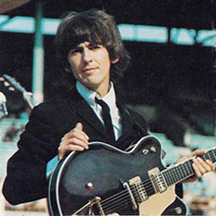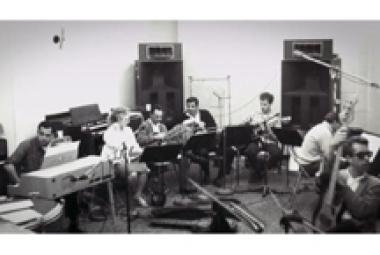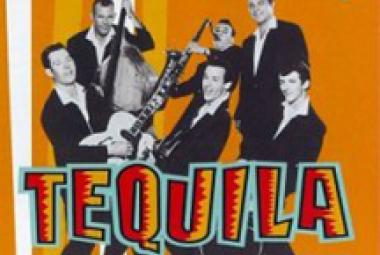George Harrison (25 February 1943 – 29 November 2001) was an English musician, multi-instrumentalist, singer and songwriter, and music and film producer who achieved international fame as the lead guitarist of the Beatles. One of Harrison’s compositions, “Something” became the Beatles’ second-most-covered song. By 1965 he had begun to lead the Beatles into folk rock through his interest in the Byrds and Bob Dylan, and towards Indian classical music through his use of the sitar on “Norwegian Wood (This Bird Has Flown)”. After the band’s break-up in 1970, Harrison released the triple album All Things Must Pass, from which two hit singles originated. He also organised the 1971 Concert for Bangladesh with Indian musician Ravi Shankar. In 1988 co-founded the platinum-selling supergroup the Traveling Wilburys. He is a two-time Rock and Roll Hall of Fame inductee – as a member of The Beatles in 1988, and (posthumously) for his solo career in 2004. (More from Wikipedia)
The impact of this one Elvis recording can hardly be overstated. “Heartbreak Hotel” was one of the biggest influences on John Lennon that inexorably led to the formation of the Beatles.
John Lennon is not the only British rock legend who was similarly affected by “Heartbreak Hotel”. George Harrison was only 13 and riding his bike past a friend’s house when he overheard the song being played in 1956; he said the song gave him a “rock and roll epiphany”. The following year, Harrison auditioned to be the guitarist for John Lennon’s early band the Quarrymen.
(June 2013/1)
Phil Spector perfected his renowned “Wall of Sound” technique while making girl group records, where massive amounts of music were recorded together with a subtle echo effect. “Sleigh Ride” by the Ronettes and “Da Doo Ron Ron” by the Crystals are cited as being prime examples of this technique. Phil Spector himself says that he reached his peak with the recording of “River Deep, Mountain High” by Ike and Tina Turner; George Harrison has called that song “a perfect record from start to finish”.
* * *
“Fanny” is an interesting slang term: Here in North America, the reference is to the buttocks (hence the cover shot on their first album, Fanny); but in the British Commonwealth, it means the female vulva. Former Beatle George Harrison is the one who suggested the name Fanny to producer Richard Perry; the bandmembers themselves were not aware of its meaning on the other side of the Atlantic Ocean until much later.
(October 2013)
* * *
By contrast, the people at Gear Fab Records – one of the better reissue record companies – are quite enthusiastic about Homer; Galen Niles was brought in to write the liner notes for the 2012 CD, Homer. (The record company name comes from two Beatles-era expressions for “cool”; both are featured in the background singing on “All Those Years Ago”, the 1981 George Harrison song honoring recently assassinated John Lennon and also featuring the other two living Beatles in the band).
(April 2014)
* * *
Cream officially broke up in July 1968, though the band performed in England as late as November. Cream’s final album, Goodbye was drawn primarily from concert recordings at The Forum in Los Angeles on October 19, 1968, but it also included a studio version of one of Cream’s finest performances, “Badge” (co-written by Eric Clapton and George Harrison).
* * *
Shortly after Blind Faith broke up, Eric Clapton began playing as a sideman with a completely different group, Delaney & Bonnie and Friends, a rock/soul collaboration of Delaney Bramlett and his wife Bonnie Bramlett with a whole parade of musicians: Besides Clapton, Wikipedia lists Duane Allman, Gregg Allman, George Harrison, Leon Russell, Bobby Whitlock, Dave Mason, Rita Coolidge, and King Curtis.
* * *
Eric Clapton continued to keep a relatively low profile in order to counter the star worship that he was attracting. In 1970, Eric Clapton assembled another band consisting of the rhythm section from Delaney & Bonnie and Friends – Bobby Whitlock (keyboardist and vocals), Carl Radle (bass) and Jim Gordon (drums) – plus Dave Mason on guitar. This quintet backed George Harrison on his monumental solo album, All Things Must Pass.
* * *
After appearing only at the Concert for Bangladesh that George Harrison organized in 1972, Pete Townshend of the Who brought together an allstar line-up for a 1973 concert intended to bring Eric Clapton out of hiding and to help him kick his habit. Known as the Rainbow Concert, musicians on hand include Rick Grech and Stevie Winwood from Blind Faith, Jim Capaldi (who had co-founded Traffic with Winwood), Anthony “Reebop” Kwaku Baah (a percussionist from Ghana who played with Traffic and also the German band Can), Ron Wood (then in Faces), and drummer Jimmy Karstein (who was on hand for the final album by Buffalo Springfield).
(May 2014)
* * *
George Harrison had something to say about “Yesterday” as well: “Blimey, he’s always talking about that song. You’d think he was Beethoven or somebody!”. Producer George Martin also talked about the song at a later date:
“‘[Yesterday]’ wasn’t really a Beatles record and I discussed this with Brian Epstein: ‘You know this is Paul’s song . . . shall we call it Paul McCartney?’ He said ‘No, whatever we do we are not splitting up the Beatles.’”
(June 2015)
* * *















